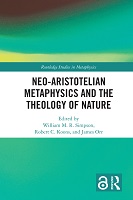Chapter 7 The Power to Perform Experiments
Proposal review
| dc.contributor.author | De Haan, Daniel D. | |
| dc.date.accessioned | 2023-03-08T10:58:17Z | |
| dc.date.available | 2023-03-08T10:58:17Z | |
| dc.date.issued | 2022 | |
| dc.identifier.uri | https://library.oapen.org/handle/20.500.12657/61654 | |
| dc.description.abstract | Do humans have abilities to perform scientific experiments? Do humans possess real powers for performing scientific experiments? I shall treat these two questions in turn where the first will bring us to the second. I shall argue that the scientific image of humans must cohere with the manifest image of humans as having the ability to exercise rational embodied control, which constitutes the power to perform scientific experiments. I first argue why rational embodied control is indispensable to the ability to perform a scientific experiment. I then argue that an ontology of causal powers provides the best explanation for this ability to make the causal difference in reality required for scientists to effectively perform scientific experiments and arrive at scientific truths. I then conclude by considering a major objection against the alternative standard causal theory of action, which would also undermine the thesis that scientists perform experiments. I show why neo-Aristotelian causal power realism does not face this objection in its explanation of how scientists exercise real rational embodied causal control within their experiments. | en_US |
| dc.language | English | en_US |
| dc.subject.classification | thema EDItEUR::Q Philosophy and Religion::QD Philosophy::QDT Topics in philosophy::QDTJ Philosophy: metaphysics and ontology | en_US |
| dc.subject.classification | thema EDItEUR::Q Philosophy and Religion::QR Religion and beliefs::QRA Religion: general::QRAB Philosophy of religion | en_US |
| dc.subject.other | William M.R. Simpson, Robert Koons, James Orr, Nicholas Teh, Hasok Chang, Stephen Boulter, David Oderberg, Janice Chik, Daniel De Haan, Antonio Ramos-Diaz, Christopher Hauser, Travis Dumsday, Ross Inman, Anne Peterson, Edward Feser, Alexander Pruss, Neo-Aristotelian metaphysics, theology of nature, science and theology, Aristotelianism, naturalism, pluralism, substantial powers, materialism, thermochemical powers, proportionality, evolution, essentialism, animal powers, causal powers, experiments, mathematical powers, hylomorphism, philosophy of nature, grounding | en_US |
| dc.title | Chapter 7 The Power to Perform Experiments | en_US |
| dc.type | chapter | |
| oapen.identifier.doi | 10.4324/9781003125860-10 | en_US |
| oapen.relation.isPublishedBy | 7b3c7b10-5b1e-40b3-860e-c6dd5197f0bb | en_US |
| oapen.relation.isPartOfBook | c68a71d7-d439-455c-9cd2-42a748157fd0 | en_US |
| oapen.relation.isFundedBy | d09f4ed8-30ae-4da8-85b7-f3af555a6f33 | en_US |
| oapen.relation.isbn | 9780367637149 | en_US |
| oapen.relation.isbn | 9780367646981 | en_US |
| oapen.imprint | Routledge | en_US |
| oapen.pages | 29 | en_US |
| peerreview.anonymity | Single-anonymised | |
| peerreview.id | bc80075c-96cc-4740-a9f3-a234bc2598f1 | |
| peerreview.open.review | No | |
| peerreview.publish.responsibility | Publisher | |
| peerreview.review.stage | Pre-publication | |
| peerreview.review.type | Proposal | |
| peerreview.reviewer.type | Internal editor | |
| peerreview.reviewer.type | External peer reviewer | |
| peerreview.title | Proposal review | |
| oapen.review.comments | Taylor & Francis open access titles are reviewed as a minimum at proposal stage by at least two external peer reviewers and an internal editor (additional reviews may be sought and additional content reviewed as required). |

